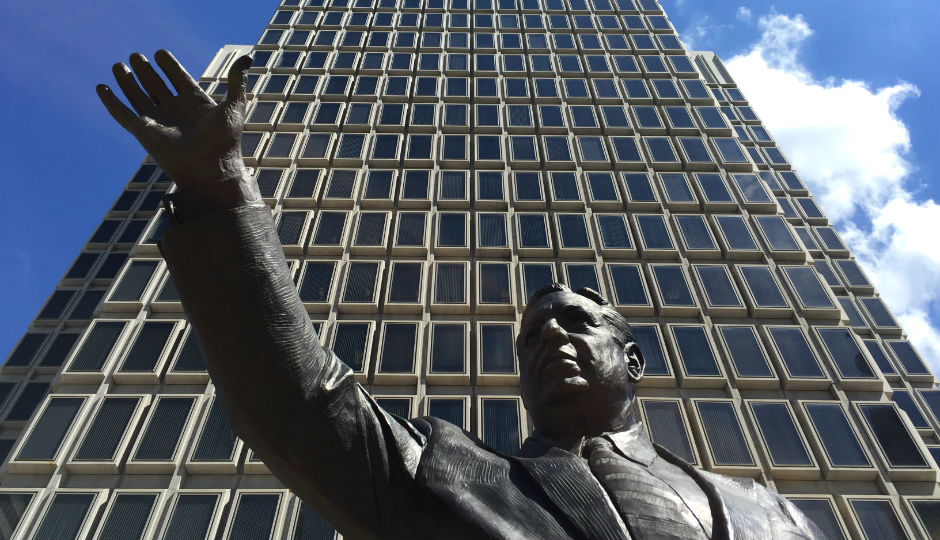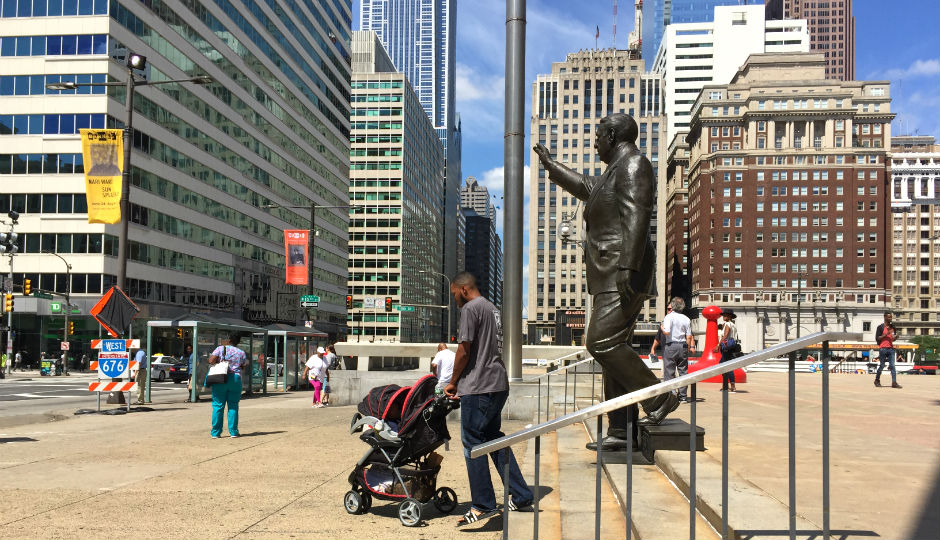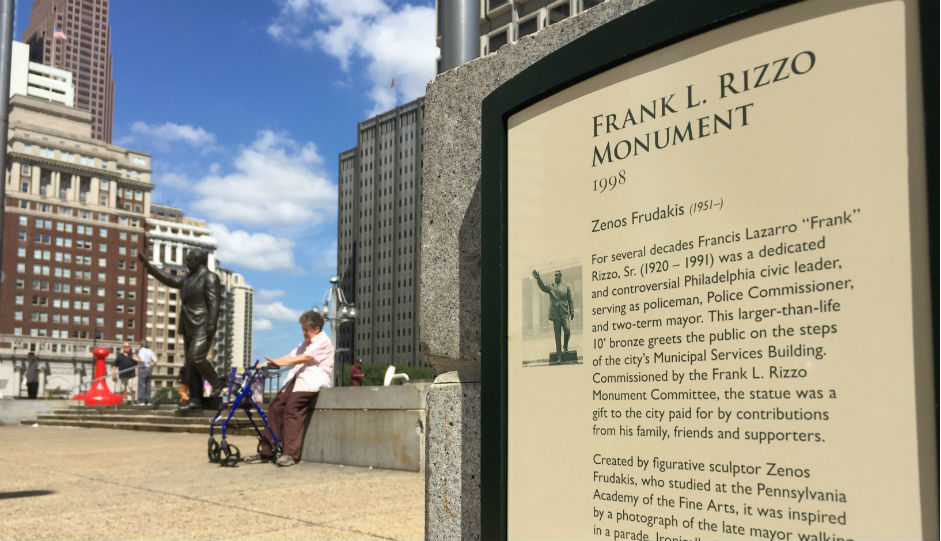Should Philly Take Down Its Statue of Frank Rizzo?

Frank Rizzo statue | Photo by Jared Brey
Over the last few years, cities and institutions around the country have been struggling with questions about whether to remove public art that depicts racist historical figures and rename buildings dedicated to them. Is it now Philadelphia’s turn to enter the fray?
Last week, Erica Mines, an activist who’s been involved with the Black Lives Matter movement in Philadelphia, created a petition asking the city to take down the 10-foot-tall statue of former Mayor Frank Rizzo descending a staircase across from City Hall.
“The removal of this statue would be the first step in acknowledging Rizzo’s crimes against the African-American community,” Mines wrote in the petition. “It would be a much-needed step towards truth and reconciliation, and holding police accountable for misconduct. This is something that is long overdue in this city. The removal of the Rizzo statue would also remove the constant reminder that our city actively supported a racist demagogue and then immortalized him as someone worthy of honor.”
So far, 259 people have signed the petition. Mines was not available for an interview.
In 1970, while he was the city’s police commissioner, Rizzo raided and strip-searched a group of Black Panthers who police suspected had been involved in the murder of a police officer, and who Rizzo had blamed for the crime. Pictures of naked Panthers being strip-searched later made it into newspapers, though they hadn’t been involved in the killing. In private conversations, Rizzo reportedly used the n-word frequently when talking about black people. During his second mayoral campaign, according to an obituary in the Inquirer, Rizzo told a friend, “Forget about the n——s, I don’t need ’em.”
Even when his actions weren’t overtly racist, the nightstick tucked into his cummerbund made it abundantly clear what he was about. Rizzo built his career as a “law-and-order” man, a barely disguised signal that he was the one who would keep (white) neighborhoods safe from (black) criminals. His approach to public life antagonized black communities.
The Rizzo statue is owned by the City of Philadelphia today, but it was commissioned and paid for by the former mayor’s friends and family. It was dedicated in 1998, eight years after Rizzo died while making yet another run for the mayor’s office. It is certainly the most prominent statue of a mayor in Philadelphia, and Kelly Lee, the city’s Chief Cultural Officer, said the only other one she knows of is a statue of Morton McMichael, who served as mayor in the 1860s. The McMichael statue is in Lemon Hill. (A third mayoral statue is dedicated to Richardson Dilworth, though you wouldn’t know that by looking at it. It’s placed near the Society Hill Towers.)
Zenos Frudakis, the sculptor who created the Rizzo statue, said last week that the commission to create the piece broke open his career. Frudakis, who also made the well-known Freedom Sculpture at 16th and Vine, said that in the 1990s he wasn’t in a position to turn down such a big project, even if he had wanted to.
“I never voted for Rizzo,” Frudakis said. “I had a couple opportunities to do so.”
Frudakis said that he was working on a bust of Wilson Goode, Philly’s first black mayor, at the very moment when Rizzo’s monument committee came to visit his studio and decided to offer him the Rizzo commission. He has created at least three sculptures of the black civil rights leader Martin Luther King, Jr., and he recently installed a statue of the singer and civil rights activist Nina Simone at her hometown in North Carolina.
“My whole thing is that I want to do work that’s socially relevant and conscious,” Frudakis said. “I have an agenda. It’s a progressive agenda. It’s populist. But if I didn’t stay in the business, I couldn’t have done that.”
Lee, the city’s Chief Cultural Officer, said she didn’t know of any previous instance in which public art in Philadelphia had been taken down amid controversy over what it represents. To be sure, Mines’ proposition is likely to be a contentious one: Rizzo still has fans in the city, and they’re often as passionate as his critics.
What would it say to take down such a prominent piece of public art depicting Rizzo? Well, it might say that Philadelphia doesn’t want to celebrate a legacy of racism and police brutality. That seems like a thing worth considering.

Photo by Jared Brey

Photo by Jared Brey
Follow @JaredBrey on Twitter.


